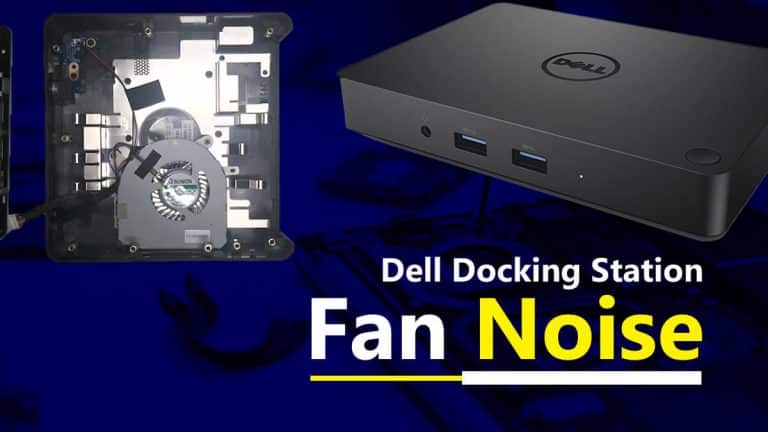Dell docking station fans make a loud noise, that’s what many consumers say. Many people are concern about the new dell docking station fan noise problem. Dell is currently working on a solution. Many people say that the sound of the fan can be heard when the computer is not in use. Dell is aware of the trouble, and is working to fix it as soon as possible.
Dell docking station fan noise is an issue that is annoying for consumers or users. Why does this happen, and what should be done to get rid of it?
There are always issues in our society and there are thousands of solutions. Dell Docking Station Fan Sound is a common issue. Dell works for their customers and is committed to providing the best service to consumers. How to Connect Airpods to HP Laptop
Some conservative buyers are asking to express their views as they hear Fan Noise from the Dell Docking Station. Dell has tried and solved it out of their responsibility.
Causes of Dell Docking Station Fan Noise
1. Overheating Components
One of the primary reasons for fan noise in a Dell Docking Station is overheating. When internal components, such as the CPU and GPU, work hard, they generate heat. To prevent damage from excessive heat, the docking station’s fan activates to cool these components. If the system is under heavy load—for example, when running resource-intensive applications—the fan may run continuously or at a higher speed, resulting in noticeable noise.
2. Dust and Debris Buildup
Over time, dust and debris can accumulate inside the docking station, particularly around the vents and fan. This buildup restricts airflow, causing the fan to work harder to maintain optimal temperatures. As a result, the fan can become noisier as it struggles to provide adequate cooling.
3. High Resource Usage
Running multiple applications simultaneously or using software that demands significant processing power can lead to increased heat generation. When the system senses elevated temperatures due to high resource usage, it triggers the fan to ramp up its speed, leading to increased noise levels.
4. Inadequate Ventilation
The placement of the docking station can significantly affect its performance and noise levels. If it is situated in a confined space or on soft surfaces like beds or couches, airflow may be restricted. This lack of proper ventilation can cause the docking station to overheat, prompting the fan to operate at higher speeds, resulting in more noise.
5. Faulty Hardware
In some cases, the fan itself may be the source of the noise. If the fan is damaged, misaligned, or worn out, it may produce unusual sounds or fail to operate efficiently. Hardware malfunctions can lead to inconsistent cooling and increased noise levels.
6. Firmware and Driver Issues
Outdated or incompatible firmware and drivers can also contribute to fan noise. These software components play a critical role in managing system performance and cooling. If they are not up to date, the docking station may not function optimally, leading to overheating and increased fan activity.
7. Environmental Factors
External environmental factors, such as high ambient temperatures or humidity, can also impact the performance of the docking station. In warmer conditions, the device may struggle to maintain a safe operating temperature, leading to increased fan activity and noise
If that doesn’t work, you can try to adjust the fan’s speed using the Dell Power Manager. AMD Radeon RX 6950 XT is the perfect graphics card for gamers!
The fan noise can be a bit loud and annoying, but it is not harmful. You can try to reduce the fan noise by turning off the docking station when you are not using it.
Solutions to Reduce Dell Docking Station Fan Noise
1. Regular Cleaning
One of the most effective ways to reduce fan noise is to keep the docking station clean. Dust and debris can accumulate inside and around the vents, restricting airflow. Regularly using compressed air to blow out dust from the vents and fan can significantly improve airflow and cooling efficiency, leading to quieter operation.
2. Optimize Airflow and Ventilation
Proper placement of the docking station is crucial. Ensure that it is situated in a well-ventilated area, ideally on a hard, flat surface. Avoid placing it in confined spaces or on soft surfaces that can block airflow. Enhancing airflow around the device can help keep temperatures down, reducing the need for the fan to work hard.
3. Manage Resource Usage
Monitoring and managing the applications running on your computer can also help reduce fan noise. Close unnecessary programs, especially those that consume a lot of CPU or GPU resources. Utilizing task manager tools can help identify resource-hungry applications, allowing you to optimize performance and minimize heat generation.
4. Update Drivers and Firmware
Keeping your drivers and firmware up to date is essential for optimal performance. Manufacturers often release updates that improve efficiency, fix bugs, and enhance cooling management. Regularly check the Dell support website for updates to ensure that your docking station operates as efficiently as possible.
5. Use a Cooling Pad
Incorporating a cooling pad can provide additional airflow and cooling for your docking station. These pads typically have built-in fans that help dissipate heat, allowing your device to run cooler. This can reduce the reliance on the docking station’s internal fan, leading to a quieter experience.
6. Adjust Power Settings
Tweaking your computer’s power settings can also impact performance and cooling. Opt for balanced or power-saving modes instead of high-performance settings. These modes can reduce the workload on the CPU and GPU, generating less heat and consequently decreasing fan activity.
7. Limit Peripheral Connections
Disconnect any unnecessary peripherals connected to the docking station. Devices that draw power or require significant resources can contribute to overheating. By minimizing connections, you can help reduce the overall load on the docking station.
8. Seek Professional Help
If fan noise persists despite taking these measures, it may be indicative of a hardware issue. Contacting Dell support or a professional technician can provide insights and solutions for potential hardware malfunctions, such as a failing fan or other internal components.
When to Seek Help for Dell Docking Station Fan Noise
If you’ve implemented various solutions to reduce the fan noise of your Dell Docking Station and the problem continues or escalates, it may be time to seek professional assistance. Here are some signs and situations that warrant contacting Dell support:
1. Persistent Loud Noise
If the fan noise remains consistently loud after trying cleaning, optimizing airflow, and managing resource usage, this could be a red flag. An unusually loud fan might indicate that the fan is working harder than it should be due to overheating or a malfunction.
2. Frequent Overheating
If your docking station frequently overheats, leading to shutdowns or system performance issues, it’s essential to address the problem. Overheating can damage internal components and may necessitate repairs or replacements.
3. Inconsistent Fan Behavior
If you notice that the fan operates erratically—such as turning on and off frequently, or running at high speed even during light usage—it could signal a hardware problem. Normal operation typically involves a fan that adjusts its speed based on the thermal needs of the device.
4. Performance Issues
Experiencing system lag, crashes, or failures in connectivity can sometimes be linked to fan issues. If the fan is not functioning properly, it may not be cooling components effectively, leading to performance degradation.
5. Visible Damage or Unusual Sounds
If you see physical damage to the docking station or hear unusual sounds (such as grinding or rattling) coming from the fan, it’s crucial to stop using the device and seek help. These signs may indicate that the fan is failing or that there are internal issues that could worsen if not addressed.
6. Outdated Hardware
If your docking station is older and you’ve consistently faced issues despite following best practices for maintenance, it may be time to consider hardware upgrades or replacements. Dell support can provide guidance on whether repair or replacement is the best course of action.
7. Warranty Considerations
If your docking station is still under warranty, contacting Dell support for assistance is advisable. They can help diagnose the issue and may offer repairs or replacements at no additional cost, ensuring you get the most out of your investment.
8. Unsuccessful Troubleshooting
If you’ve tried all recommended troubleshooting steps without success, reaching out to Dell support is a logical next step. Their technical support team has the expertise to diagnose issues that may not be apparent to users and can provide tailored solutions.
Conclusion: Dell Docking Station Fan Noise
Dell Docking Station fan noise is a common concern for users, often stemming from factors like overheating, dust buildup, high resource usage, and inadequate ventilation. While some noise is normal, persistent or unusually loud fan sounds can indicate underlying issues that need attention.
To mitigate fan noise, users can implement various solutions, such as regular cleaning, optimizing airflow, managing resource-intensive applications, and updating drivers. If these measures do not resolve the problem, seeking assistance from Dell support is advisable, especially if there are signs of overheating or hardware malfunctions.
Addressing fan noise promptly not only enhances the user experience but also helps maintain the longevity and performance of the docking station, ensuring a quieter and more efficient workspace.
FAQs about Dell Docking Station Fan Noise
Overheating, dust buildup, high resource usage, and inadequate ventilation can cause fan noise.
Some noise is normal, but consistently loud fan noise may indicate a problem.
Clean the docking station, ensure good ventilation, manage resource usage, and consider a cooling pad.
If fan noise persists after troubleshooting or if there are signs of overheating, contact Dell support.
Yes, dust can obstruct airflow, causing the fan to work harder and increase noise levels. Regular cleaning is important.




